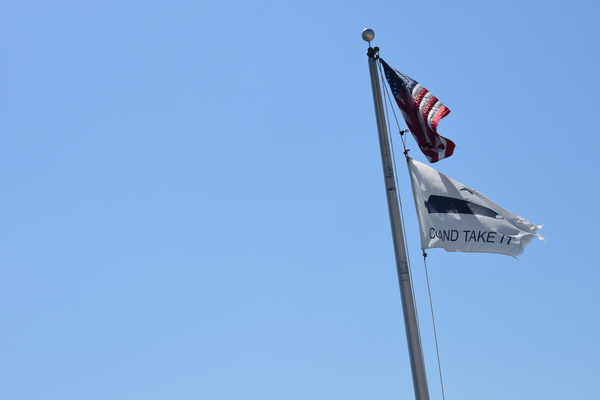Americans love the “Come and Take It” Flag of Texas fame, perhaps, just a bit too much. (Hear me out on this, OK?) Whenever the federal government appears to overstep its bounds, targeting some unobjectionable household object in its convoluted web of red tape and regulations, somebody somewhere (probably Texas) is bound to attach the defiant motto of Texan rebellion to a meme of the item in question within 15 minutes. Whether the “it” is toilet paper, lawnmowers, gas stoves, or Thanksgiving dinner, we boldly taunt “big daddy government to keep its hands off” — a non-serious — or at least only half serious — threat that this is the hill we’ll die on.
It’s a parody, of course — an overzealous assertion that just as the patriots in Gonzales, Texas, fought and died for their freedom, so, too, will we fight and die for… fill in the blank. Naturally, however, there’s a world of difference between fighting to defend a single small cannon, crucial to self-defense, and fighting to defend our stoves and turkeys, and most of us know it.
But, perhaps, the difference between the two is not so vast as we might sometimes imagine.
The Come and Take It Flag recently made a predictable reappearance when the Supreme Court ruled that Texas does not possess the right to install razor wire on its disastrous southern border with Mexico. The internet brigades of meme-makers quickly went to work; pictures of razor-wire fencing plastered with the vociferous slogan swiftly made their debut.
Only this time, the conflict proved much bigger than past disputes about irritating red tape, escalating into a volatile 25-state showdown with the federal government. In fact, many perceived the face-off as a potential prelude to war, with some 55% of surveyed voters expressing their belief that “The feds are staging a civil war, and Texas should stand their ground.”
And just like that, overtures to the famed flag from Gonzales did not seem so far-fetched.
Indeed, major conflicts like this prove that the “smaller” battles — the seemingly less significant ones — matter more than we previously realized.
Philosopher Alexis de Tocqueville said this about our slippery bent toward authoritarianism: “After having thus taken each individual one by one into its powerful hands, and having molded him as it pleases, the sovereign power extends its arms over the entire society; it covers the surface of society with a network of small, complicated, minute, and uniform rules, which the most original minds and the most vigorous souls cannot break through to go beyond the crowd; it does not break wills, but it softens them, bends them and directs them; it rarely forces action, but it constantly opposes your acting; it does not destroy, it prevents birth; it does not tyrannize, it hinders, it represses, it enervates, it extinguishes, it stupefies, and finally it reduces each nation to being nothing more than a flock of timid and industrious animals, of which the government is the shepherd.”
In other words, if we are not willing to declare “come and take it” over more slight infractions — the inoffensive “network of small, complicated, minute, and uniform rules” — we will eventually lack the moral will, power, or strength to say so over more flagrant infringements.
It all only starts with the showerheads and ceiling fans and gas stoves, and we roll our eyes. “What’s the big deal?” we wonder. But, then it’s our individual right to self-defense. Then it’s an entire state’s right to self-defense. And before we know it, we’re all under the thumb of “big daddy government,” totally conditioned for perfect control.
As I previously opined (when the U.S. Department of Energy announced new “energy-efficient” fan regulations), “The parallels between Tocqueville’s discourse on despotism and America today are staggering. The lines between his hypothesis and our reality are blurred. Perhaps inane showerhead regulations are not evil in and of themselves, but perhaps they are indicative of a Machiavellian trend. Perhaps they are indicative that government as nanny shall soon be replaced by government as king.”
Therefore, on second thought, Americans do not love the Come and Take It Flag nearly enough. And our use of that phrase, as comical or disproportionate as it may appear at times, is entirely fitting in the face of a government that seeks to bend us, direct us, and ultimately reduce us “to being nothing more than a flock of timid and industrious animals.”
Tocqueville warned that the endless flow of unassuming bureaucratic paperwork and officialism might eventually lead to more serious and tyrannical control. This present crisis of self-governance proves him right.
Through an Article V amendments convention, the states must raise a Come and Take It banner over the rights and freedoms of their citizens. It's more than just a meme — it’s the battle cry of an alert, watchful, and vigilant people.
To join the fight against big government despotism, sign the Convention of States petition below and join the grassroots army today.
Come and Take It: Is this the prelude to war?
Published in Blog on January 29, 2024 by Jakob Fay






